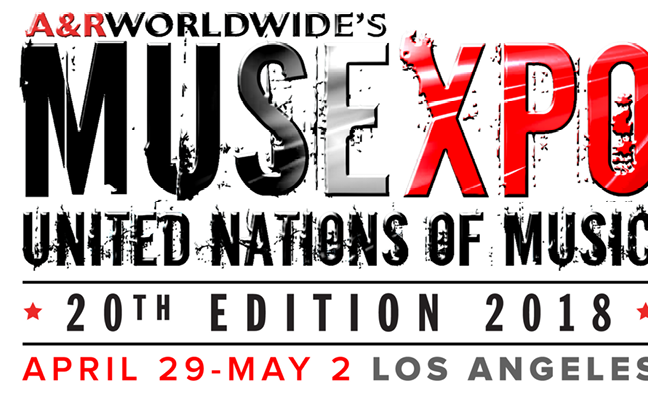Day 3 of the MUSEXPO conference in Los Angeles was hit by some very British weather – and UK execs also talked up a storm during the panel programme.
As the rain fell outside, the day began with a digital panel as execs debated where technology would take the industry next. PledgeMusic founder and blockchain pioneer Benji Rogers starred, skewering the biz’s relationship with tech via a number of pithy quotes.
“Data is the same thing as money, they’re equivalent in a digital landscape,” he said at one point. “Why did Taylor Swift keep her album off Spotify for three weeks? Because she got more money & more data by doing so.”
Rogers also drew laughs in the room – and praise on Twitter – by declaring: “The music industry has a very strong immune system. It views inbound technology as a virus.”
Others on the panel warned about trusting perceived wisdom around technology, with InGrooves CEO Bob Roback stressing appearing on popular Spotify playlists wasn’t the be-all and end-all.
“It can be valuable but you need to be looking several levels deeper than that,” he said.
That would have been music to the ears of Bob Shennan. The BBC Radio & Music director gave a keynote interview with Music Week editor Mark Sutherland and technology was again on the agenda, specifically streaming services’ attempts to take radio listeners.
“We’ve no intention of being replaced,” he said. “We have no desire to sit around and manage decline, we want to make sure we have resonance and relevance in the future.”
Shennan said he wore streaming services’ desire to poach BBC staffers such as Zane Lowe and George Ergatoudis as “a badge of honour”, but said the corporation's tastemakers continued to lead the world in gut instinct-based curation.
"At the BBC we rely very much on human beings,” he said. “Of course, we use data but, at the heart of it, it is human curation [that matters]."
Another BBC man, Radio 1/1Xtra head of music Chris Price weighed in on the topic during the afternoon live panel, explaining that the station was so early on some acts that instinctive decisions were often the only option.
“As a new music station, we’re often playing music before there’s any data to go on,” he said. “So the most important thing is the passion of our presenters.”
Price also noted, however, that ticket sales were important indicators to be considered when deciding support for new artists.
“The one thing you can’t fake is bums on seats,” he said.
Meanwhile, veteran booking agent and recent Music Week cover star Neil Warnock, global head of touring at UTA, said agents had a vital role to play in breaking new acts.
“If we don’t invest in new artists, we’re not investing in the future,” he said. “All of my agents are looking at new artists all the time.”
Warnock said the rise of streaming was returning the business to its 1960s model, where bands built a fanbase on the road and released singles, while albums were less important.
“If streaming is building more people listening to more music in more genres, then I’m all about it,” he said. “But you need connectivity right the way through.”
MUSEXPO’s conference programme has now wrapped, although the event continues tomorrow with its awards, which will honour BBC Radio 1 and 2 with the International Music Icon Of The Year gong.
To catch up on the Day 1 coverage, click here. For Day 2, click here. To read Music Week's current interview with Shennan, click here.
Reporting by Emmanuel Legrand & Mark Sutherland.









